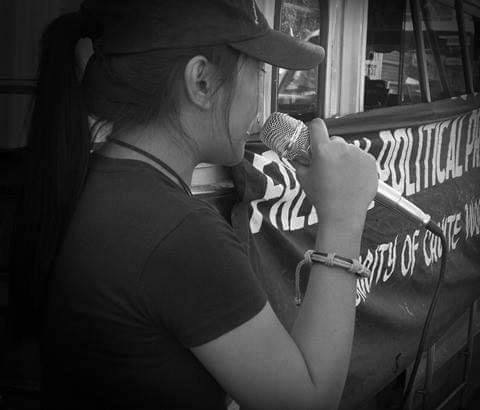Danah Marie Marcellana’s walk to freedom and justice
By Nuel M. Bacarra
A daughter of a human rights martyr is now a human rights defender herself two months after being released from jail. She is Danah Marie Marcellana, daughter of the martyred Eden and veteran peasant leader Orly.
Like many political prisoners who have regained freedom, Dana is now a member of the Samahan ng mga Ex-Detainess Laban sa Detensyon at Aresto (SELDA). She was released on bail last October 6 this year after more than two years in jail on trumped up charges. At 1 AM on June 25, 2021, elements of the Philippine National Police (PNP) and the military swooped down on Marcellana’s home in Barangay San Gabriel, San Pablo, Laguna and arrested her and her husband Christian Relao without presenting any warrant. The two were accused of the standard kidnapping, murder, rebellion and illegal possession of firearms charges against activists. Realo is still in jail however.
Danah’s story is not a simple one. She was only in her day care years when her mother, then secretary general KARAPATAN-Southern Tagalog was killed with peasant leader Eddie Gumanoy, then chairperson of peasant group Katipunan ng Samahang Magbubukid sa Timog Katagalugan (KASAMA-TK). Eden and Eddie led an 11-person fact finding mission to look into a report of a human rights violation case in Gloria town in Mindoro, Occidental. After the mission, they were waylaid by soldiers along the road and took Gumanoy and Marcellana and three others separately on April 21. The next day, the bodies of Gumanoy and Marcellana were found in a ditch in Bansud, Mindoro Oriental. General Jovito Palparan was then the commanding officer of the 204th Brigade of the Philippine Army in Mindoro.
Danah’s family is from Quezon that boasts of an active peasant movement that, in turn, is fueled by landlessness and the cruelty of the landlords. Her father Orly is a fierce farmer leader of Tanggol Magsasaka-Timog Katagalugan. Because of her mother’s assassination and the incessant harassments to their family, Danah grew up militant, herself becoming a peasant organizer of KASAMA-TK when arrested.
A young wife and mother at the time of their arrest, Danah experienced depression and other mental anguish in jail. These were compounded by the deplorable situation in prison facilities and the violent and unjust manner of their arrest. When a warrant was finally shown her in prison, she found out that she was charged with alleged crimes that happened in 2008 when she was only 12 years old.

At a protest rally at the Department of Justice (DOJ) in Padre Faura last December 5, Danah narrated how angry she was at the time. “After twenty years of seeking justice for the death of my mother here at DOJ, the government now focused its attacks on me,” she said.
Like fellow political prisoners Amanda Echanis and Reina Mae Nasino who both had their child in prison, Danah was still nursing her one year old baby when she was arrested. She also narrated that that National Task Force to End Local Communist Armed Conflict (NTF-ELCAC) personnel can barge into PNP lock up cells to intimidate, threat with death of arbitrarily or include anybody in its list of fake surrenderees.
In her two years in jail, she learned that elderly and sickly women political prisoners are subjected to harsh treatment, as in the case of Virginia Villamor, 67, who was forced to lay prostrate by the police resulting to a crack in her knees and pelvic bones. There were others, like Cleofe Lagtapon who at 68 is now in the Correctional Institute for Women for alleged illegal possession of firearms; Evangeline Rapanot, 71, from Cagayan from who suffers multiple health problems; and Fe Serrano, 65, from Southern Tagalog who is facing more than 35 different criminal cases under the Anti-Terrorism Act.
Dana said that elderly women political prisoners are particularly vulnerable to the inhumane treatment in inmates, the over-congestion of jails, the inadequate prison food, woeful state of medical services and the slow-paced trial of trumped-up charges against them.
As it had been when she decided to become a peasant organizer like her father, it was as easy for Danah to agree to join SELDA and become a human rights defender like her late mother. “These injustices that I, my family and other political prisoners have suffered are enough reasons to continue fighting,” she said.
“There are no high enough walls, no cyclone wires, no isolation that women political prisoners cannot handle in our quest for freedom,” she added. #
